Following the second webinar of the 2023-24 season on 23rd November, with Gary Kerr, a recording has now been made available on YouTube which you can view using this link.

Following the second webinar of the 2023-24 season on 23rd November, with Gary Kerr, a recording has now been made available on YouTube which you can view using this link.

CCFG will be hosting their next webinar – How can silvicultural systems help adapt forests to climate change?
with Gary Kerr, Thursday 23rd November 2023 4-5pm
This online event is hosted by CCFG featuring Gary Kerr who will deliver a 30 minute presentation on this topic. This will be followed by a question and answer session for participants.
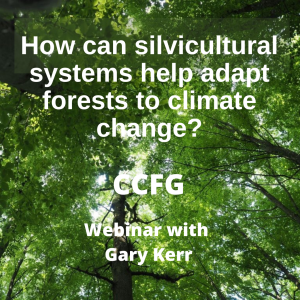 The talk will describe the main silvicultural systems we can use to manage forests and give a personal view about their application in Britain. In addition, the talk will give a summary of a the main risks to forests from climate change, the possible impacts and the evidence base for how the use of continuous cover can help mitigate these risks. Finally, the talk will consider how best to communicate ‘how to do continuous cover’ to new audiences. Along the way Gary will be asking the audience some questions, so have a paper and pen handy and be honest with yourself when the answers are revealed!
The talk will describe the main silvicultural systems we can use to manage forests and give a personal view about their application in Britain. In addition, the talk will give a summary of a the main risks to forests from climate change, the possible impacts and the evidence base for how the use of continuous cover can help mitigate these risks. Finally, the talk will consider how best to communicate ‘how to do continuous cover’ to new audiences. Along the way Gary will be asking the audience some questions, so have a paper and pen handy and be honest with yourself when the answers are revealed!
Gary was the Principal Silviculturist for Forest Research until September 23. The main thrust of his work has been applied silvicultural research and this has led to over 50 papers in peer reviewed journals, 16 Forestry Commission publications and over 50 articles in professional publications communicating the results of research. For the last ten years his work has focussed on alternative approaches to management and continuous cover silviculture. He was the Editor-in-Chief of Forestry: An International Journal of Forest Research, published by Oxford University Press for 20 years. After retiring from Forest Research he divides his time between working as the Commissioning Editor for the Quarterly Journal of Forestry, Chairing the Scientific Advisory Board of the European Forest Institute and continuing his association with FR as a Research Fellow.
Research until September 23. The main thrust of his work has been applied silvicultural research and this has led to over 50 papers in peer reviewed journals, 16 Forestry Commission publications and over 50 articles in professional publications communicating the results of research. For the last ten years his work has focussed on alternative approaches to management and continuous cover silviculture. He was the Editor-in-Chief of Forestry: An International Journal of Forest Research, published by Oxford University Press for 20 years. After retiring from Forest Research he divides his time between working as the Commissioning Editor for the Quarterly Journal of Forestry, Chairing the Scientific Advisory Board of the European Forest Institute and continuing his association with FR as a Research Fellow.
IF YOU WOULD LIKE TO ATTEND YOU CAN BOOK YOUR TICKET HERE

CCFG will be hosting their next webinar – Coppice, Carbon and Catastrophes: The Joy and Pain of Managing for CCF in Our Times
with Arne Pommerening, Thursday 26th October 2023 4-5pm
This online event is hosted by CCFG featuring Arne Pommerening who will deliver a 30 minute presentation on this topic. This will be followed by a question and answer session for participants.
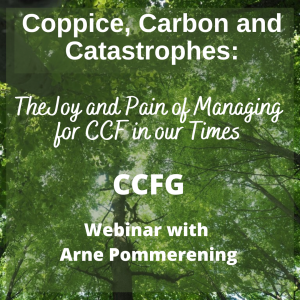 Continuous Cover Forestry (CCF), i.e. forest management based on ecological principles, has been introduced to Ireland and the UK more than twenty years ago. Whilst in the early days identifying simple and robust methods of transforming plantations to woodlands with more complex structures were the primary concern, ongoing climate change and the recent energy crisis have added new challenges of managing for CCF. Many policymakers including the authors of the recent EU forest strategy and of associated recommendations proposed by the European Forest Institute see CCF as a major instrument for mitigating adverse effects of climate change. In this context, carbon forestry has become a major buzzword and a research field in its own right, however, it is still largely unknown how exactly existing woodlands should be managed for optimising carbon sequestration. Questions like “Is carbon forestry part of or a concept separate from CCF?” or “Can carbon forestry be carried out along with other management objectives or is a special focus required?” are hotly debated. Ongoing climate change and all its localised realisations such as spontaneous gales, droughts, floods and insect calamities can always bring the sudden end to any CCF woodland that we have transformed for many years with great effort. In that situation we may be left with little more than bare ground and methods are needed to establish new CCF
Continuous Cover Forestry (CCF), i.e. forest management based on ecological principles, has been introduced to Ireland and the UK more than twenty years ago. Whilst in the early days identifying simple and robust methods of transforming plantations to woodlands with more complex structures were the primary concern, ongoing climate change and the recent energy crisis have added new challenges of managing for CCF. Many policymakers including the authors of the recent EU forest strategy and of associated recommendations proposed by the European Forest Institute see CCF as a major instrument for mitigating adverse effects of climate change. In this context, carbon forestry has become a major buzzword and a research field in its own right, however, it is still largely unknown how exactly existing woodlands should be managed for optimising carbon sequestration. Questions like “Is carbon forestry part of or a concept separate from CCF?” or “Can carbon forestry be carried out along with other management objectives or is a special focus required?” are hotly debated. Ongoing climate change and all its localised realisations such as spontaneous gales, droughts, floods and insect calamities can always bring the sudden end to any CCF woodland that we have transformed for many years with great effort. In that situation we may be left with little more than bare ground and methods are needed to establish new CCF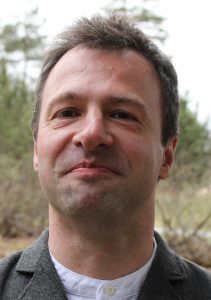 woodlands from scratch. CCF from scratch may also include the use of coppice systems, particularly the use of coppice with standards and coppice selection systems. Such system can contribute to satisfying the current demand for sustainable energy whilst creating diverse habitats and providing high-quality timber at the same time.
woodlands from scratch. CCF from scratch may also include the use of coppice systems, particularly the use of coppice with standards and coppice selection systems. Such system can contribute to satisfying the current demand for sustainable energy whilst creating diverse habitats and providing high-quality timber at the same time.
Arne Pommerening is a professor at the Department of Forest Ecology and Management of the Swedish University of Agricultural Sciences (SLU) at Umeå in Northern Sweden. For more than 20 years he has taught CCF to university classes in the UK, Switzerland and Sweden. Whilst working at Bangor University in Wales between 2000 and 2011, he contributed to the introduction of CCF in the UK and offered seminars in Ireland. Arne has recently published a textbook entitled “Continuous Cover Forestry – Theories, Concepts and Implementation” and he is currently involved in the introduction of CCF to Sweden.
IF YOU WOULD LIKE TO ATTEND YOU CAN BOOK YOUR TICKET HERE

CCFG visit to Forest of Dean. We will be hosted by James Williams, the Forest of Dean Forester responsible for the areas visited. The day will be spent looking at a number of stands of Douglas fir being managed under various continuous cover systems and some underplanting of Corsican pine. Particular subjects for interest will be: changing contractor mindsets, dealing with deer and wild boar, and excessive Western hemlock regeneration. This day will be the opportunity for discussion on a wide range of sites managed under CCF in parts of one of England’s largest and oldest state forests.
We will meet at Beechenhurst, where there is a café and toilets. We’ll assemble by the café building and then drive in convoy in the least number of vehicles possible to the first site. Please note that there may be a charge for parking (TBC). Also, the postcode may take you to the Speech House Hotel. The what3words reference for the site is enchanted.groomed.sharper and the grid reference is SO614120.
Please meet us at 9.30, ready to leave at 10.00. We will probably finish around 15.30-16.00.
Please ensure you bring wet weather clothing suitable for the time of year, and a packed lunch/ drinks for the day.

CCFG members last had a formal visit to Kielder in 2004 and a lot has happened since then in England’s largest forest This visit will be hosted by James Clark the forester responsible for all CCF and thinning operations in Kielder. We will be visiting a number of sites in the North Tyne valley where recent thinning has taken place for both visual reasons and to encourage natural regeneration. We will also be able to discuss the impacts of storm Arwen in 2021 on many of the previous areas where CCF management was being undertaken within the valley.
Meeting place: Kielder castle : Post code NE48 1ER (car park and toilet available here before the visit and at lunch time).
Meeting time: 09.30 (depart at 10.00 prompt in shared vehicles)
Expected finish 15.30-16.00
Lunch: Bring your own food and drink
Suitable all weather clothing and PPE (High vis top and helmet) essential (and the famous Kielder midge may still be joining us!)
If you have booked a place and later find you are unable to attend please contact Polly (administrator@ccfg.org.uk) in case someone else is able to fill your place.
To book your place, please use this link

This year’s Scottish CCFG visit is to Trees for Life’s Dundreggan Rewilding Centre to look at the ideas and practices behind the work the organisation’s rewilding project. The 4,000ha estate comprises a mix of remnant Caledonian pine woodland and other native woodland including a significant amount of juniper, a new native woodland and open hill land. Trees for Life also have a native woodland nursery specialising in growing higher altitude species.
The visitor services team have arranged a day visit for us which will look at the nursery and the existing woodland. The challenges of establishing successful native species regeneration with deer pressures and competing vegetation will be a theme common to all foresters. We will be able to see over the native woodland planting but there will not be time to go into it. We will also have a chance to find out more about the approach of Trees for Life, discuss their approach to public engagement and awareness and not forgetting the lessons from the cultural landscape round about.
Trees for Life do make a charge for tours. CCFG will meet part of the cost for members.
To make a booking please use this link
Arrangements
Timings
10.00am – 4.00pm
Please be ready to start at 10am. We will finish by 4pm at the latest.
If you need to be away before 4pm please let Polly know so that you can be on the nursery tour in the afternoon as this is close to the car park.
Meeting point is in the foyer inside the Centre
Charge
There will be a change for this visit which CCFG will partially cover leaving a charge of £15 for members (£5 for students) to be paid in advance. Non-members will be asked to pay the full per head cost of £27.
Site conditions
The walk through the woodland is on a narrow, rough hill path rising to c300m, wet in places. Please wear suitable footwear and clothing. There are alternative lower level surface paths around the Centre if you are unable to do the hill walk which would be self guided.
Biosecurity
As usual please ensure footwear is clean before coming on the visit. This is particularly important because of the nursery element.
Facilities
There is plenty of parking at the Centre
There are also toilets at the centre
Lunch
There is a café at the centre but bringing your own lunch is advised as the café is unlikely to be able to cope with a large demand at lunch time within the time we have allocated. However, it is open between 9.30 and 4.30 so if you arrive early or can stay on then coffee and cake can be purchased.
Booking arrangements
The numbers will be strictly capped to 40 as the tours can only accommodate a maximum of 20 people. We will split into 2 groups for 2 half day tours swapping over at lunch time. One tour looking at the Centre and the Nursery and the other walking in the woods. Places should be booked in advance and are allocated on a first come first serve basis.
If you book and are then unable to come please let Polly (administrator@ccfg.org.uk) know so that the place can be reallocated.
We are delighted to announce that we plan to run a study tour to Ireland from Wednesday 27th – Saturday 30th September 2023, in conjunction with Pro Silva Ireland.
SILVICULTURE IN IRELAND
Forestry in Ireland has a similar history to that in Great Britain, with widespread deforestation up until the 20th century followed by an extensive reforestation programme based largely on the use of non-native species such as Sitka spruce. More recently, there have been increasing policy commitments to greater use of native species and to the wider use of Continuous Cover Forestry. For example, in 2019, a new grant scheme dedicated to supporting CCF was introduced by the Irish government. This forms part of wider measures designed to supporting the sustainability and resilience of Irish forests.
Pro Silva Ireland was founded in 2000 and now has over 100 members drawn from all parts of the Irish forest sector.
Our visit will be based in County Wicklow to the south west of Dublin and within easy access of Dublin airport and other means of public transport.
The indicative cost is £400 per person and will include your bus and excursions, three nights accommodation, three breakfasts, three packed lunches and two evening meals (note the Wednesday evening meal is not included, to allow you to travel at your own convenience and arrange to eat en route or when you arrive at the hotel at your own expense).
You will need to arrange and pay for your own travel but please do not book yet!
Please see the full Ireland – Outline programme and booking form for further information. Register to attend by completing the form included which should be sent to: administrator@ccfg.org.uk
Please note, we have a maximum of 20 places in total, so please complete the registration form early to avoid disappointment.
Non-members may also apply.
STUDENT PLACES
We are also offering two subsidised places to student members, which will cost £100 each (in addition to arranging your own travel). If you would like to be considered for one of these places, please email administrator@ccfg.org.uk with a statement (1 side of A4/ 500 words) explaining exactly why you as an individual would like to attend this study tour, with as many details as possible. The deadline for this is also 18th August.

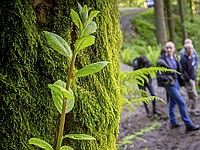
| Date: | Saturday 7th October 2023 |
| Location: | Wales – Coed Fron Drain and Bwlch y Mynydd, nr Mold, Flintshire |
| Meeting Time: | 10:00am |
|
|
|
| Description: |
We will visit a mixed farm woodland (PAWS) that has recently had second thinning and enrichment planting, where a marteloscope has been installed for training farmers and forestry students in single stem selection. The second site we will visit is a larger private forestry estate with compartments of monoculture plantation Douglas fir, Sitka spruce and larch, regenerating cherry with some areas of PAWS with remnant broadleaves. An ISN research stand has been established in one of the compartments having a thinning history. The owner is considering different options to transform the plantation to continuous cover. The meeting will be hosted by the two forest owners and Jonathan Hulson (North Wales Wildlife Trust) and Phil Morgan (Sustainable Forest Management Ltd). We will have lunch at the first site and drive to the second site in convoy. We expect to finish by 2.30pm, walking distance approx 4km. There are no toilets on site. We advise you to bring a packed lunch and clothing to suit any weather we may encounter. Spaces are limited so please book early to avoid disappointment. |
| Booking: |
To book your space to attend this event please complete our booking form: Here |
| Contact: |
If you have any questions please contact: administrator@ccfg.org.uk. |
Following the last webinar of the 2022-23 season, which was well attended on 29th June with up to 80 people participating, a recording has now been made available on YouTube which you can view using this link.
Dr Andrew Cameron, who presented it, has also made available the references he used at the end of the presentation, which you can view here.
For those wishing to go into full detail, the chat file from the Zoom meeting is also available here. As a note, Charlie Taylor was a forester on the Tay District for many years and was involved in the management, while Andrew Cameron and Aberdeen University were carrying out the experiment.

CCFG will be hosting their next webinar – Developing permanent irregular forest structures: Lessons from Faskally Forest
with Andrew Cameron, Thursday 29th June 2023 4-5pm
This online event is hosted by CCFG featuring Andrew Cameron who will deliver a 30 minute presentation on this topic. This will be followed by a question and answer session for participants.
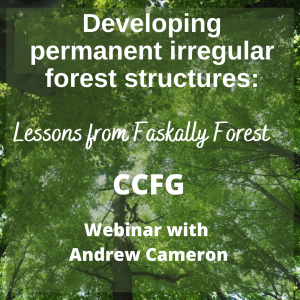
The Faskally Forest transformation was established in 1953 by Prof Mark Anderson of Edinburgh University with the aim of creating a permanent irregular forest based on European plenter stands. The original forest dates back to the early part of the twentieth century as a planted mixture of Norway spruce, Scots pine, European larch, Douglas fir, and European beech. At the start of the transformation in the 1950s, gaps created in the canopy were established using a combination of natural regeneration and planting of predominately shade/semi-shade-tolerant Douglas fir, Norway spruce, western hemlock, and European beech, and smaller proportions of shade-intolerant Scots pine, European larch, and silver birch. The study at this time was primarily viewed as a learning process to determine what does and does not work.
Records of the study from the early 1960s to the late 1980s are sparse, although some input into the area had taken place over this period. Increased interest in irregular forestry from the late 1980s saw a return to more intensive management of the site, and by the early 1990s the area was managed under the selection system.
A one hectare permanent sample plot was established in 1997 by the University of Aberdeen to study the latter stages of the transformation. Complete inventories of the sample plot were carried out at six year intervals starting in 1997 and subsequently in 2003, 2009, 2015, and 2021. In this seminar, Andrew will present an overview of the study spanning a period of almost 25 years. It will describe the development of stand structure and species composition and contrast a range of stand metrics with data from established Continental plenter forests.
Andrew Cameron is a senior lecturer in the Institute of Biological and Environmental Sciences at the University of Aberdeen. His career has spanned practical forest management, research, and education. His forest management experience started with the Forestry Commission at Cowal Forest District in Argyll before moving to North York Moors Forest District in North Yorkshire.
He returned to the University of Aberdeen in 1989 to lecture in silviculture and forest planning. His research interests include how wood properties are influenced by silviculture and genetic selection, transformations of even-aged stands into irregular structures, use of alternative productive species, and the impact of climate change on forests.
He has advised governments in Holyrood and Westminster on various aspects of forest policy. He produced a report for the COP26 conference in Glasgow in 2021 on the importance of productive forests in climate change mitigation and in reducing natural and semi-natural forest loss. He has recently made presentations at three Westminster Parliamentary committees on forest expansion and climate change. He has over 80 peer reviewed publications.
IF YOU WOULD LIKE TO ATTEND YOU CAN BOOK YOUR TICKET HERE
